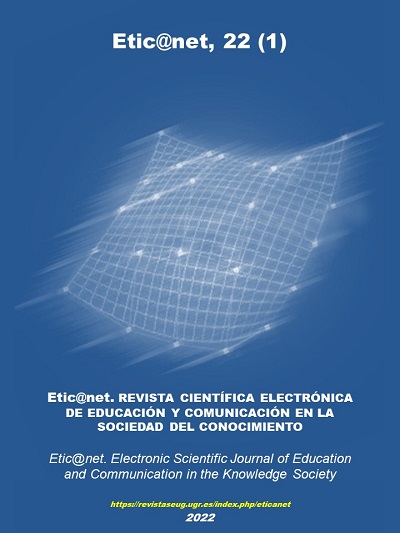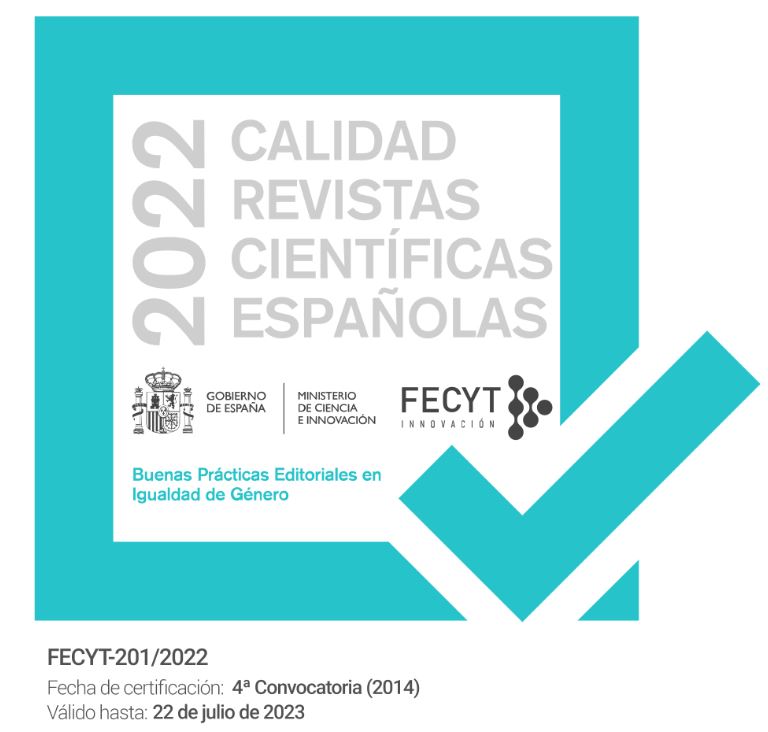Using Mentimeter in higher education: online digital tool to encourage and enhance the acquisition of knowledge in a fun way
DOI:
https://doi.org/10.30827/eticanet.v22i1.22262Keywords:
Mentimeter, active learning, gamification, educational innovationAbstract
With the emergence of COVID-19, the educational community has needed to incorporate new methodological approaches to face the new forms of teaching required by the pandemic scenario. One of these approaches is gamification, which implies introducing educational content in a playful way. In Higher Education, gamification must have a level of complexity that the most popular programs can't provide. Mentimeter is a program that is based on an online audience software and allows a wide range of questions and questionnaires significantly suitable for the educational level analysed. It facilitates the active learning of students, increasing their attention, commitment and motivation, thus allowing the student to be the centre of the teaching-learning process. This article analyses the use of Mentimeter in a wide range of classes of various university disciplines and reviews its theoretical and practical potential for the improvement of teaching-learning processes, the acquisition of knowledge by students and the use of new teaching methodologies.
Downloads
References
Ahmad, K. A. (2020). Teaching difficult physiological concepts to the medical students using Minicases, Educreations and Mentimeter. The FASEB Journal, 34(S1). https://doi.org/10.1096/fasebj.2020.34.s1.04977
Borrás-Gené, O., Martínez-Núñez, M. y Martín-Fernández, L. (2019). Enhancing fun through Gamification to improve engagement in MOOC. Informatics, 6(3), 28. https://doi.org/10.3390/informatics6030028
Caldwell, J. E. (2007). Clickers in the Large Classroom: Current Research and Best-Practice Tips. CBE Life Sciences Education, 6(1), 9-20. https://doi.org/10.1187/cbe.06-12-0205
Careaga-Butter, M., Badilla-Quintana, M. G. y Fuentes-Henríquez, C. (2020). Critical and prospective analysis of online education in pandemic and post-pandemic contexts: Digital tools and resources to support teaching in synchronous and asynchronous learning modalities. Aloma, 38(2), 23-32. https://doi.org/10.51698/aloma.2020.38.2.23-32
Colás-Bravo, M. P. (2021). Retos de la Investigación Educativa tras la pandemia COVID-19. Revista de Investigación Educativa, 39(2), 319-333. https://doi.org/10.6018/rie.469871
Corchuelo-Rodríguez, C.A. (2018). Gamificación en educación superior: experiencia innovadora para motivar estudiantes y dinamizar contenidos en el aula. EDUTEC, Revista Electrónica de Tecnología Educativa, 63, 29-41. https://doi.org/10.21556/edutec.2018.63.927
Deslauriers, L., McCarty, L. S., Miller, K., Callaghan, K. y Kestin, G. (2019). Measuring actual learning versus feeling of learning in response to being actively engaged in the classroom. Proceedings of the National Academy of Sciences of the United States of America, 116(39), 19251–19257. https://doi.org/10.1073/pnas.1821936116
Gokbulut, B. (2020). The effect of Mentimeter and Kahoot applications on university students’ e-learning. World Journal on Educational Technology: Current Issues, 12(2), 107–116. https://doi.org/10.18844/wjet.v12i2.4814
Hernández Prados, M. A. y Collados Torres, L. (2020). La gamificación como metodología de innovación educativa. En: Rivera Espinosa, R. (Ed). Actas V Congreso internacional virtual sobre La Educación en el Siglo XXI. Universidad Autónoma Chapingo, México. Recuperado de: https://www.eumed.net/actas/20/educacion/13-la-gamificacion-como-metodologia-de-innovacion-educativa.pdf
Hernández Rivero, V. M., Santana Bonilla, P. J. y Sosa Alonso, J. J. (2021). Feedback y autorregulación del aprendizaje en educación superior. Revista de Investigación Educativa, 39(1), 227-248. https://doi.org/10.6018/rie.423341
Hill, D. L. y Fielden, K. (2017). Using Mentimeter to promote student engagement and inclusion. In: Pedagogy in Practice seminar, 18 December 2017, Fusehill Street, Carlisle, UK. (Unpublished). Recuperado de: http://insight.cumbria.ac.uk/id/eprint/3473/
Jiménez, V., Alvarado, J. M., Calaforra, P. J. y Castillo, A. (2021a). Application of the Flipped Classroom and use of ICT as an innovative methodology in Higher Education. INTED2021 Proceedings (pp. 2066-74). https://doi.org/10.21125/inted.2021.0453
Jiménez, V., Alvarado, J.M. y Llopis, C. (2017). Validación de un cuestionario diseñado para medir frecuencia y amplitud de uso de las TIC. Eductec-e. Revista Electrónica de Tecnología Educativa, 61, 1-14. https://doi.org/10.21556/edutec.2017.61.949
Jiménez, V., Alvarado, J.M. y Méndez-Salazar, L.R. (2021b). Un modelo estructural para la detección temprana del abandono en la universidad: metacomprensión, TIC y motivación hacia la titulación de Trabajo Social. Alternativas. Cuadernos de Trabajo Social, 28(2), 1-21. https://doi.org/10.14198/ALTERN2021.28.2.02
Mayhew, E. (2019). No longer a silent partner: how Mentimeter can enhance teaching and learning within political science. Journal of Political Science Education, 15(4), 546-551. https://doi.org/10.1080/15512169.2018.1538882
Mayhew, E., Davies, M., Millmore, A., Thompson, L. y Pena Bizama, A. (2020). The impact of audience response platform Mentimeter on the student and staff learning experience. Research in Learning Technology, 28. https://doi.org/10.25304/rlt.v28.2397
Mohin, M., Kunzwa, L. y Patel, S. (2020). Using Mentimeter to enhance learning and teaching in a large class. (Preprint). https://doi.org/10.35542/osf.io/z628v
Moorhouse, B.L. y Kohnke, L. (2020). Using Mentimeter to elicit student responses in the EAP/ESP classroom. RELC Journal, 51(1), 198-204. https://doi.org/10.1177/0033688219890350
Morillas, C. (2016). Gamificación de las aulas mediante las TIC: un cambio de paradigma en la enseñanza presencial frente a la docencia tradicional (Tesis doctoral, Universidad Miguel Hernández). Recuperado de: http://dspace.umh.es/bitstream/11000/3207/1/TD%20%20Morillas%20Barrio%2c%20C%c3%a9sar.pdf
Oliva, H. A. (2016). La gamificación como estrategia metodológica en el contexto educativo universitario. Realidad y Reflexión, 44, 29-47. https://doi.org/10.5377/ryr.v44i0.3563
Pichardo-Galán, J. I., Blázquez-Rodríguez, M., Borras-Gené, O., Carabantes, D., Cornejo, M., González Enríquez, I., Hernández Melián, A., Isorna Alonso, E., Jiménez, V., Logares, M., López Medina, E., Mancha Cáceres, O. y Ramos Toro, M. (2021). El uso de Mentimeter para promover la generación colectiva de conocimiento y la participación del alumnado en el aula y en el campus virtual. Jornada Aprendizaje Eficaz con TIC en la UCM. Recuperado de: https://www.ucm.es/aprendetic/file/57
Puspa, A. e Imamyartha, D. (2019). Experiences of social science students through online application of Mentimeter in English milieu. IOP. Conf. Series: Earth and Environmental Science, 243. https://doi.org/10.1088/1755-1315/243/1/012063
Sánchez-Caballé, A., Gisbert-Cervera, M. y Esteve-Mon, F. (2020). The digital competence of university students: a systematic literature review. Aloma, 38(1), 63-74. https://doi.org/10.51698/aloma.2020.38.1.63-74
Shpakova, A., Dörfler, V. y MacBryde, J. (2016). Gamification and innovation: a mutually beneficial union. BAM2016 Conference Proceedings. Recuperado de: https://strathprints.strath.ac.uk/57904/
Skoyles, A. y Bloxsidge, E. (2017). Have you voted? Teaching OSCOLA with Mentimeter. Legal Information Management, 17, 232-238. https://doi.org/10.1017/S1472669617000457
Vergara Rodríguez, D., Mezquita Mezquita, J. M., Gómez Vallecillo, A. I. y Fernández-Arias, P. (2020). Sistemas de respuesta de estudiantes: evolución hacia la gamificación. Revista de Tecnología de Información y Comunicación en Educación, 14(2), 236-250. Recuperado de: https://revistaeduweb.org/index.php/eduweb/article/view/27
Walss Aurioles, M. E. (2021). Diez herramientas digitales para facilitar la evaluación formativa. Tecnología, Ciencia y Educación, 18, 127-139. https://doi.org/10.51302/tce.2021.575
Wood, A. (2019). Utilizing technology-enhanced learning in geography: testing student response systems in large lectures. Journal of Geography in Higher Education, 44, 160-170. https://doi.org/10.1080/03098265.2019.1697653
Published
Issue
Section
License
The authors who publish in this journal agree to the following terms: The authors retain the copyright and grant the journal the right to be the first publication of the work as well as licensed under a Creative Commons Attribution License that allows others to share the work with an acknowledgment of the authorship of the work and the initial publication in this magazine. Authors are allowed and encouraged to disseminate their work electronically (for example, in institutional repositories or on their own website) before and during the submission process, as it may lead to productive exchanges as well as further citation. Earliest and greatest of published works (See The Effect of Open Access).













